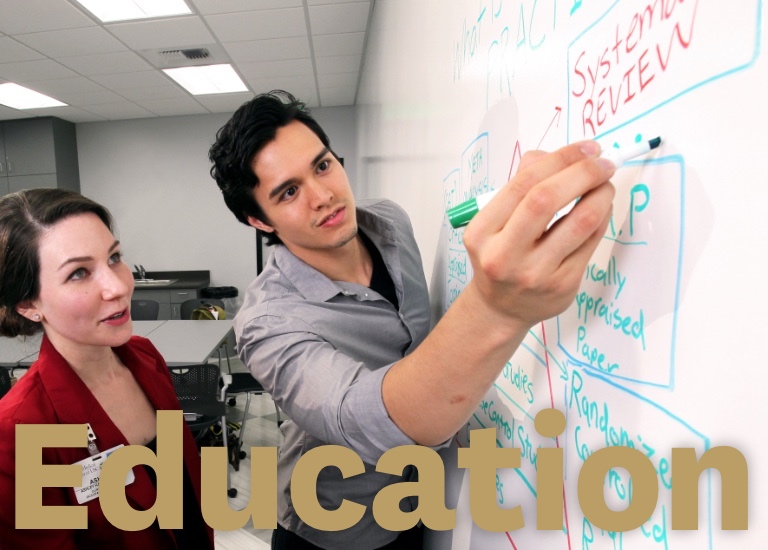Post-Professional Doctorate (OTD)
of Occupational Therapy
About OTD Residencies
Post-Professional OTD students complete a residency within a key leadership pathway:
- Pedagogy
- Clinical Research
- Administrative Leadership
- Advanced Clinical Practice
USC Chan Residencies
All information, including details regarding financial support, is updated every August and subject to change each year.
Pedagogy Pathway (Chan Residencies)
The Pedagogy Pathway offers opportunities for clinicians interested in pursuing faculty positions to explore pedagogy teaching best-practices, and curriculum development. Students gain experience in course design, student support and classroom management while supporting curricula in the Chan undergraduate and professional degree programs. Seasoned practitioners returning for their post-professional doctoral degree will gain teaching expertise as well as knowledge and skills in academic administration and accreditation necessary to become outstanding clinical faculty. Coursework complements the residency experience and serves to develop mastery of innovative pedagogical approaches. Applicants for the Pedagogy Pathway participate in an interview with Dr. Julie McLaughlin Gray, Associate Chair of Curriculum and Faculty, and a team of faculty, to determine their acceptance into the Pathway. The residency is located within the Chan Division of Occupational Science and Occupational Therapy, or at another academic institution.
Clinical Research Pathway (Chan Residencies)
The Clinical Research Pathway is designed to prepare residents to participate in evidence-based studies in clinical settings and to collect outcomes data as part of practice.
Why would I consider the OTD Clinical Research Track?
This track equips the OTD graduate with a subset of skills to participate in evidence-based studies in clinical settings, collect outcomes data as part of practice, lead quality improvement initiatives at a clinical site, and/or participate as a clinical/project manager of a research team.
What is involved in the OTD Clinical Research Track?
Applicants for the Clinical Research Track of the OTD program will participate in an interview process to determine acceptance into the Track. Once accepted into the Clinical Research Track, the resident completes his or her residency in one of the Division’s research labs, typically with a faculty member who has an actively-funded research project.
What if none of the actively-funded projects match my interests?
There may be additional projects that are not currently listed as ‘actively-funded,’ but have been approved for future funding that may match with your planned OTD residency start. In addition, some faculty may have other resources to support OTD residents on preliminary projects that are not funded by grants. When appropriate and with approval of the OTD Program Director and Association Chair of Research, individual, voluntary (i.e., no financial support) residencies may also be developed.
Who are the faculty conducting research in the Division?
A summary of all Chan Division faculty who are actively conducting research is shown below. These summaries are meant to provide interested applicants with an overview of various research being conducted and should be used to investigate potential residency options. In addition to this list, more information for each faculty member can be found on the individual faculty member’s page, and at chan.usc.edu/research/faculty.
Alison Cogan | Rehabilitation and Functional Recovery Studies in Health Services (ReFReSH) Lab ⟩
Beth Pyatak | Lifestyle Redesign for Chronic Conditions (LRCC) Lab ⟩
Bobbi Pineda | Occupational Therapy NICU Lab ⟩
Grace Baranek | Innovations in Neurodevelopmental Sensory Processing Research (insp!re) Lab ⟩
Joy Agner | Health Equity Action Lab (HEAL) ⟩
Leah Stein Duker | Tailored Environmental Modifications (TEM) Lab ⟩
Lisa Aziz-Zadeh | Center for the Neuroscience of Embodied Cognition ⟩
Shawn Roll | Musculoskeletal Sonography & Occupational Performance (MSOP) Lab ⟩
Sook-Lei Liew | Neural Plasticity and Neurorehabilitation Laboratory (NPNL) ⟩
Stacey Schepens Niemiec | Healthy Aging Research and Technology (HART) Lab ⟩
Administration Leadership Pathway (Chan Residencies)
The Policy and Administration Track is designed to prepare residents as executive decision makers, public policy advocates or administrators who will serve as change agents to lead the profession forward. Applicants for the Policy and Administrative Track of the OTD program participate in an interview process at the respective residency site to determine their acceptance into the Track.
Chan Division Autism Initiative ⟩
Advanced Clinical Practice Pathway
This pathway offers you the opportunity to remain in your current clinical context and develop skills to lead quality improvement initiatives, implement innovative programs, and evaluate outcomes of your practice.
⋯





